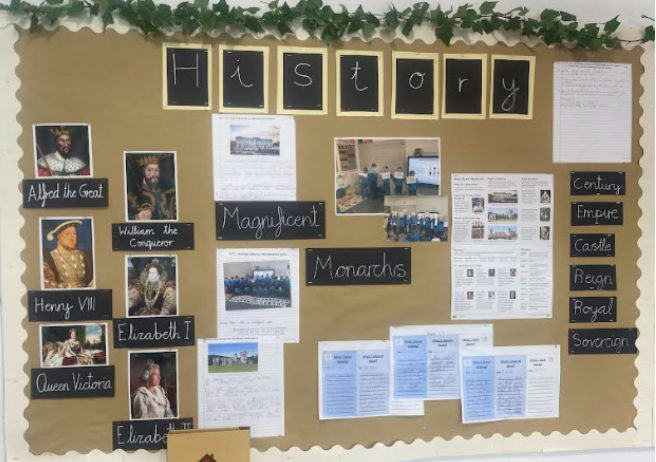Humanities
We aim to deliver a history curriculum that is accessible to all and that will maximise the outcomes for every child so that they know more, remember more and understand more.
History Intent
Our teaching of history will help pupils gain a secure knowledge and understanding of Britain’s past and that of the wider world. The curriculum is structured in a way that allows for children to make links between current and previous learning. Teachers use the long term plans for history to make comparisons between historical periods previously taught, developing children’s chronological knowledge and understanding from the Stone Age to present day.
We want children to be curious to know more about the past and to have the skills required to explore their own interests. History lessons focus on working as historians and developing historical skills and there are many opportunities for the curriculum to be enriched through historical visits, visitors and events held in school.
We aim to enable children to ask perceptive questions, think critically, weigh evidence, sift arguments, and develop perspective and judgement. It is important for children to develop a sense of identity through learning about the past and we want them to know how history has shaped their own lives.
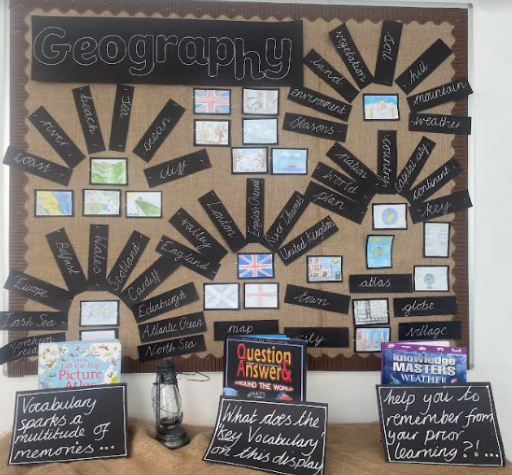
Geography Intent
At Ascot Road, we want to ensure that all pupils are given the opportunity to develop experiences and understanding of Geography, inspiring and igniting their curiosity about the wider world.The geography projects are well sequenced to provide a coherent subject scheme that develops children’s geographical knowledge, skills and subject disciplines. Geographical locations are not specified in the national curriculum, so they have been chosen to provide a broad and diverse understanding of the world. Where there are opportunities for making meaningful connections with other projects, geography projects are sequenced accordingly. For example, children revisit the geography of settlements in the history project School Days after studying types of settlements in the geography project Bright Lights, Big City. All geography projects are taught in the autumn and spring terms, with opportunities for schools to revisit less secure concepts in the summer term.
Implementation
History
The teaching of History at Ascot Road focuses on helping our pupils understand historical events and their significance. To support the programme of study for History across the school, we provide opportunities wherever possible for visits to sites of historical significance. Topics are planned to build on prior learning and pupils are encouraged to ask questions, reference timelines and challenge thinking. Tasks are often planned to be open-ended, facilitated by cross-curricular links with other subject areas (English, Geography and Music). There are also links with spiritual, moral, social and cultural development e.g. child labour in Victorian Britain, significance of Remembrance Day as part of World War II, the role of the church in Tudor times etc.
Key Stage 1
In Year 1, children begin the autumn term by studying the project Childhood. This project builds on children’s past experiences, including their family history and events within living memory, and works well as an introductory project. In the summer term, children study the project School Days. This project enables children to learn the history of their school and compare schooling in the Victorian period. In the autumn term of Year 2, children extend their studies to explore a broader range of periods in the project Movers and Shakers. This project explores the concept of significance and the significant people that have greatly influenced history. In the summer term, children study the project Magnificent Monarchs. This project introduces children to the challenging concepts of power and monarchy in preparation for more complex historical topics in Key Stage 2. The projects studied in Key Stage 1 provide numerous opportunities for children to explore significant historical events, people and places in their locality.
Lower Key Stage 2
In Year 3, children begin the autumn term by studying the chronology of British history in the project Through the Ages. This project teaches children about the significance of prehistoric periods and the changes in Britain from the Stone Age to the Iron Age. In the summer term, children continue to develop their knowledge of the chronology of British history in the project Emperors and Empires. This project teaches children about the Roman Empire, its invasion of Britain and Britain’s ensuing Romanisation.
In the autumn term of Year 4, children resume their learning about British history in the project Invasion. This project teaches children about the Roman withdrawal and the invasion and settlement of the Anglo-Saxons and Vikings. This project concludes at 1066, which meets the guidance from the national curriculum for British history. In the summer term of Year 4, children begin their studies of ancient history by studying the overview project Ancient Civilisations. This project enables children to learn about the achievements of the earliest civilisations, including ancient Sumer, the Indus Valley civilisation and ancient Egypt.
Upper Key Stage 2
In the autumn term of Year 5, children continue to build their knowledge of ancient civilisations with an in-depth analysis of ancient China in the project Dynamic Dynasties. This project enables children to study the significance and influence of ancient China and its prowess and advancements in the written word, technology and metalwork. In the summer term, children further study ancient and world history in the project Groundbreaking Greeks. This project enables children to explore life in ancient Greece, including examining the achievements and influence of ancient Greece on the western world.
In the autumn term of Year 6, children study the more complex historical issues of enslavement, colonialism and power in the project Maafa. In this project, children explore a range of African kingdoms, including the Kingdom of Benin, and study Britain’s role in the development, perpetuation and abolition of the slave trade. In the summer term of Year 6, children complete their historical studies with the project Britain at War. This project enables children to study the role war has played in Britain’s history since 1066, focusing on the First and Second World Wars as crucial turning points in British history. Throughout the history scheme, there is complete coverage of all national curriculum programmes of study.
Geography
Purposeful and relevant geographical knowledge is at the centre of our Geography curriculum. We use a variety of teaching and learning styles in our geography lessons combining enquiry-based research activities with discrete teaching of geographical knowledge and skills. We offer pupils the opportunity to use a variety of data such as maps, statistics, graphs, pictures and aerial photographs. ICT is used regularly in lessons where this serves to enhance learning. Wherever possible, pupils are involved in ‘real’ geographical activities. Fieldwork is integral to good geography teaching and we include as many opportunities as we can to involve pupils in practical geographical research and enquiry.
Key Stage 1
In Key Stage 1, each autumn term begins with essential skills and knowledge projects (Our Wonderful World in Year 1 and Let’s Explore the World in Year 2). Teaching these projects in Years 1 and 2 enables children to be introduced to, or revisit, critical geographical concepts, aspects, skills and knowledge. These projects prepare children for the study of more thematic geography projects in the following term. In the spring term of Year 1, children study the project Bright Lights, Big City. This project introduces children to the geography of urban environments and the physical and human features of the United Kingdom. In contrast, in the spring term of Year 2, children carry out a detailed study of coastal geography in the project Coastline. This project introduces children to the geography of coastal environments and provides children with the opportunity for in-depth coastal fieldwork.
Lower Key Stage 2
In Lower Key Stage 2, children begin with essential skills and knowledge projects (One Planet, Our World in Year 3 and Interconnected World in Year 4). Teaching these projects in Years 3 and 4 enables children to further develop their skills, knowledge and understanding of key geographical aspects and concepts and prepares them to study more thematic geography projects in the following term. In the spring term of Year 3, children study the project Rocks, Relics and Rumbles, which explores physical features and geographical phenomena, including earthquakes and volcanoes. In contrast, in the spring term of Year 4, children carry out a detailed study of the physical features of mountains and rivers, which includes opportunities for in-depth fieldwork.
Upper Key Stage 2
In the autumn term of Year 5, children continue to build their knowledge of ancient civilisations with an in-depth analysis of ancient China in the project Dynamic Dynasties. This project enables children to study the significance and influence of ancient China and its prowess and advancements in the written word, technology and metalwork. In the summer term, children further study ancient and world history in the project Groundbreaking Greeks. This project enables children to explore life in ancient Greece, including examining the achievements and influence of ancient Greece on the western world.
In the autumn term of Year 6, children study the more complex historical issues of enslavement, colonialism and power in the project Maafa. In this project, children explore a range of African kingdoms, including the Kingdom of Benin, and study Britain’s role in the development, perpetuation and abolition of the slave trade. In the summer term of Year 6, children complete their historical studies with the project Britain at War. This project enables children to study the role war has played in Britain’s history since 1066, focusing on the First and Second World Wars as crucial turning points in British history. Throughout the history scheme, there is complete coverage of all national curriculum programmes of study.
Impact
History
-
Outcomes have been maximised more for every child so now they know more, remember more and understand more
-
Our teaching of history has helped pupils gain a more secure knowledge and understanding of Britain’s past and that of the wider world
-
The curriculum is structured in a way that allows for children to make links between current and previous learning. Teachers use the long term plans for history to make comparisons between historical periods previously taught, developing children’s chronological knowledge and understanding from the Stone Age to present day
-
Children are now more curious to know more about the past and have developed the skills required to explore their own interests
-
History lessons now focus more on working as historians and developing historical skills and we have allowed many opportunities for the curriculum to be enriched through historical visits, visitors and events held in school
-
The children can ask increasingly perceptive questions, think critically, weigh evidence, sift arguments, and develop perspective and judgement
-
Children are developing a sense of identity through learning about the past and we want them to know how history has shaped their own lives
-
History prepares children for careers in the field such as education, law, journalism, public service, museum curation, and archival work
Geography
-
Children now have the opportunity to develop experiences and understanding of Geography
-
Children have an understanding of the world's physical features and spatial relationships
-
Children are more aware about environmental issues and encourage sustainable practices in their lives
-
children are able analyse data, evaluate evidence, and solve problems related to geography
-
Geography education prepares children for careers in fields such as urban planning, environmental science, and international relations
-
It will encourage children to engage with their local communities and take action to address local challenges
-
Geography fosters a lifelong curiosity about the world and appreciation for its diversity
What does Humanities look like in Reception?
In Reception, humanities subjects such as history and geography are typically integrated into the curriculum through a play-based, experiential approach through 'Understanding of the world’ (Development Matters).
Children learn to talk about the past and explore and talk about pictures, stories and information books on the theme of royalty and knowing key knowledge e.g. Kings and queens are rulers of a country. Children share stories and talk about events in the past, for example, people travelled to the moon in a space rocket and Neil Armstrong visited the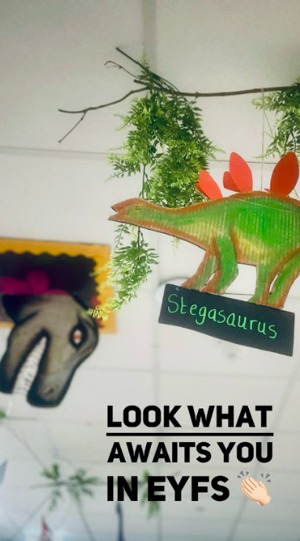 moon. children are able to make observations about objects and artefacts from the past, such as toys, clothes and other items relating to everyday life. They explore the local history and are able to share stories and talk about significant people who lived in the past. They are also taught to put familiar events in chronological order, using pictures and discussion.
moon. children are able to make observations about objects and artefacts from the past, such as toys, clothes and other items relating to everyday life. They explore the local history and are able to share stories and talk about significant people who lived in the past. They are also taught to put familiar events in chronological order, using pictures and discussion.
Children are encouraged to explore their immediate environment, including their home, neighbourhood, and natural surroundings. Through sensory experiences and hands-on activities, they develop an understanding of basic geographical concepts such as location, space, and the natural world.
At Ascot Road, children are provided opportunities for hands-on experiences such as planting seeds in a garden, exploring artefacts and objects from the past, and creating maps and models. These activities help children develop observational skills, spatial awareness, and an understanding of cause-and-effect relationships. Children get to visit Cassiobury Park where they can learn about habitats, plants and animals as well as learning about our local history.
We use floorbooks in Reception to show all our learning.
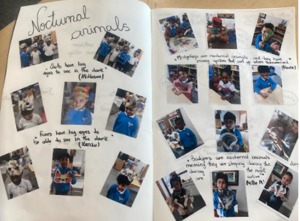
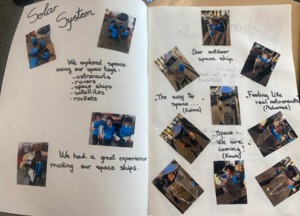
How are SEND children supported with Humanities?
Our Humanities lessons are designed to be flexible. Teachers change their teaching methods, materials, and tools to fit the needs of SEND pupils. This might mean using pictures, simpler words, or hands-on activities to help them understand better. We know that every child learns differently. SEND pupils get personalised help and adjustments to make sure they can join in and learn well when learning about History and Geography. Teachers encourage respect, kindness, and understanding among classmates. We also encourage students to work together, so SEND pupils can learn alongside their peers and have positive social experiences. Some SEND pupils might need extra help from specialists like Learning Support Practitioners or SENDCo. These experts work closely with teachers to give targeted support, adjustments, and individual attention to help SEND students succeed in Humanities.
Culture
Our school fosters a vibrant culture of Humanities through a comprehensive curriculum that has included:
-
Dedicated displays in every classroom to showcase every term’s Humanities theme
-
External visitor workshops to enhance learning, e.g. Viking Workshop, World War 2 workshop
-
Artefacts rented from our local museum
-
Enriching trips, which encompass ‘Historical and Geographical’ links, such as Year 3 visiting the Natural History Museum for their ‘Relic and Rumbles’ topic and Year 1 visiting ‘Gunnersbury Park’ to take part in a Victorian workshop and many more.

